

Atlas F1 GP Correspondent
Ferrari have smashed records like ninepins this year: 15 victories, nine one-two finishes, 221 points, and another double World Championship title are enough proof that the Maranello team have enjoyed an almost perfect season of unprecedented dominance. In an exclusive interview for Atlas F1, Will Gray heard from Rory Byrne, the designer of the invincible F2002, why the red car has been so fast, and how he plans to make it even faster for 2003. Be afraid, be very afraid...
The supreme attention to detail that has allowed Ferrari to shoot into orbit at a rate their rivals cannot cope with has been as awesome to witness as it has been upsetting to endure, and their final run of five consecutive one-twos in the final five races of the year has shown a team in a state of absolute perfection.
So depressing has that been for the fans as well as their rivals, that when Michael Schumacher and Rubens Barrichello parked their cars up at the end of the Japanese Grand Prix, the rest of the paddock breathed a collective sigh of relief. Phew. At least we won't see that again.
Well that's true. Unless Ferrari decide to head cautiously into next year in the manner they did this, by using their old car to compete in the opening races before making sure their new one is safe to race, we won't. But, as Ross Brawn, Jean Todt, Schumacher, Barrichello et al have warned...it's only going to get better.
"I am sure we will do a better job next year," Byrne told Atlas F1 this week. "I am sure the car will be better and we will perform to our normal standard. I can tell you I have got the hammer down as hard as I can go to make the fastest car we can next year - because that's my job.
"It's the opposition's job to catch us up so we will see what happens. I expect they are going to be closing the gap so I am honestly not expecting to have another season like this, that's for sure. You only get a season like this once a decade or maybe even less often than that so to say we can beat it next year is a bit presumptuous."
Indeed, it is difficult to improve on perfection. But as much as it is simply Byrne's job to make Ferraris go faster and faster, it has become an obsession for him. The South Africa-born designer has achieved the apparently impossible by doing exactly that year after year. And, as he said, he expects to continue the roll again next season.
Those improvements are a part of a continual battle to be the best, which even in these times of fixed regulations and limited design options have enabled Ferrari to make jump after jump in search of the ultimate solution. That, of course, will never come. But Byrne believes McLaren-Mercedes boss Ron Dennis' theory that the Italian team will not be able to make another giant leap is, quite simply, incorrect.
"We have made a decent step every year and I expect we are going to make a similar step this year to next year," he said. "There was a decent step in all areas on the F2002 to be honest, but we are also consistently improving our organisation, our analysis and simulation tools, our test procedures, our strategy, the whole thing. We are continuing to improve the whole company in all areas, so it is not only the car, it is the way we use the car and everything else."
The F2002 machine, as Byrne said, is currently the ultimate Grand Prix machine. Designed to the same rules specifications as their rivals, and to the same regulations as its predecessor, the F2001, it has a three-litre engine, is constructed mainly of carbon fibre, has a seven-speed semi-automatic gearbox and push-rod torsion spring suspension. It's just that it is a lot better than what has come from the Ferrari stable before and a lot better than the others could achieve.
But which specific areas does Byrne single out as the best? What were the bits that other teams would be desperate to copy? "I must admit I find it hard to answer that question," he said. "I don't know where our rivals are. But I think one of the biggest improvements we have made over the last year has been our straight-line speed relative to our main opposition.
"But overall, everything on the F2002 was new. The gearbox was completely new even to the way we produced the casing material and the way of making the casing. All the internals, the way the gearshift operates...all of that was fundamentally new. The back end was totally new, the cooling system was totally new, the way we constructed the chassis was totally new, the way we constructed the suspension was new. So although it didn't look a lot different, there was a lot of fundamental new stuff on the car."
And it didn't stop there. Ferrari only introduced the new machine onto the grid in Brazil, the third race of the year. They only had one ready and they gave it to Schumacher, not Barrichello, because he was ahead in the Championship. He used it well, and got through a first-lap clash with Juan Pablo Montoya to rocket his way to his second win of the year. By the end of the season, it had been defeated only once in 15 races.
There were, of course, improvements throughout the year. But the F2002 was such a fundamentally good car that Ferrari hardly had to touch it after Schumacher won the Drivers' World Championship in it in record time at the French Grand Prix, after the 11th race of the season. That means it only had seven races-worth of development done to it before the team concentrated on its replacement, the F2003.
"We made a lot of improvements chassis-wise up until the French Grand Prix," said Byrne. "Then, of course, you had the seven-week test ban during which period there were four races. So, with our policy that we really never fit unproven parts on the car, that meant that what we hadn't tested before the French Grand Prix didn't go on the car until Monza.
Byrne believes that their opponents' poor performances gave them the opportunity to concentrate on the future whilst cruising to success but that they have also made Ferrari look a lot better than they actually are. He insists that as soon as Williams, McLaren - or even Renault - get their act together then World Champion Schumacher and Brazilian Barrichello will have less opportunity to dominate, show-boat, and mess around with the results. But on recent records, that doesn't look like happening for a while.
Indeed, Williams have been left embarrassed by a failure to capitalise on their potential this season. Sure, on pace they have not been close to Ferrari and, probably, the succession of one-two finishes that the Italian team have achieved would not have been halted whether Williams' cars were in or out of the race. But although their combined retirements were not significantly greater than Ferrari's (seven versus five) the Championship would have been a lot closer if they had not made some silly points-costing mistakes.
German Ralf Schumacher, clocked up three retirements for the Grove-based team, starting when he crashed out of the season-opening Australian Grand Prix. He then finished 13 races before his next failure, which came at the Italian Grand Prix, then ended his season as it began with another retirement, this time from an engine blow-up, in Japan. But four times he finished outside the points, and his garage was guilty of several points-sapping failures.
His teammate Juan Pablo Montoya, meanwhile, added another four retirements to the team's tally, all of which came when he started from pole position. After an early run of form he failed to finish three times in succession - the Monaco, Canadian and the European Grands Prix - and also lost out in the Italian race, where Williams were expected to mount a serious challenge to the dominance of Ferrari.
McLaren, meanwhile, were even worse. Between their two cars they clocked up 14 retirements. That means they failed to finish more than 40 percent of the races, and that is a lot of points to miss out on. Add to that three finishes out of the points due to team slip-ups and you have a pretty good pointer to why Ferrari looked so good. Byrne agrees.
"I think it is fair to say that the actual points gap that we have on McLaren and Williams is certainly due, in a reasonable part, to their lack of reliability, let's call it. Well, worse reliability than us, let's put it that way," he said cautiously, trying to avoid the outright accusation that their rivals had not come up to scratch.
"In terms of performance, there would have been the odd race or two...Monza I expected a tougher challenge there and it sort of evaporated after five laps or so. I am sure if Ralf hadn't blown up we would have had a tougher race there, there is no doubt. But in the end, what other criteria is there to judge? It is results driven - the only thing you can't argue about is results. You can argue about all sorts of other things because they are a matter of opinion - but the results stand. They are fact."
Another fact, Byrne also pointed out, is that the cries of astonishing Ferrari reliability are reasonably unfounded. "I don't look at all the statistics, but I think if you take the finishing record of both cars this season I am not sure that it is actually any better than the finishing record of both cars last season or the season before," he said.
Looking back, he is right. This year, Barrichello retired five times, Schumacher none. Last year, together they posted six retirements, but the honours were split with Schumacher having two car failures and Barrichello having two, with another two crashes for the Brazilian making up the numbers. The year before it was eight failures, three of which were due to accidents. So, even then, the cars were more reliable than those of their most reliable close competitors this year.
"We have a philosophy of how we operate to make sure our cars are reliable," said Byrne. "Really I think reliability is down to hard work and having good systems. There is certainly no magic to it. I think the last three years our reliability has been at what I would call a good level. It is still not perfect by any means but it is at a level that I think is acceptable."
"Michael has had an incredible year," Byrne said. "Rubens had quite a few problems, certainly in the first half of the year. But I am a firm believer that there is no luck, at the end of the day it all balances out. Whether it was Michael's car or Rubens' is totally random. It is nothing to do with the engineers, the way the car was run, the chassis, the engine, the gearbox or anything.
"Certainly Rubens' finishing rate in the first half of the season was, by our standards, totally unacceptable, and really I think Michael was fortunate not to have had some of the problems that Rubens did. The fact that there was a problem, that wasn't bad luck, there was a reason for the problem. But in certainly one or two of the cases that problem could have afflicted Michael's car just as easily as Rubens' car. Michael happened to be lucky and Rubens not. Maybe it will even out next year."
Even in the latter part of the year, however, when each car and team of engineers was honed to perfection to allow the two F2002 machines to cruise to a series of five impressive successive one-two finishes, Byrne, who rarely travels to races due to his concentration on the job back at base, was still left on the edge of his armchair praying for the gremlins not to strike.
Unlike Schumacher, who has been calling for his rivals to catch up to give him a fight, Byrne, given the choice, wouldn't have it any other way. The dominance reduces the excitement of a Grand Prix, but he still gets that buzz every time the pair line up on the front row. In fact, when they do just that, he always knows things can only go downhill.
"It's not that I am afraid," Byrne said. "But you are still nervous. When you start from the front and you are leading the race it can only get worse. You sit there dreading that something is going to go wrong somewhere. You spend an hour and a half just praying that nothing is going to go wrong.
"It's not as exciting as if there was a race going on with the competitors. That would be more exciting, but I am still just as nervous whether there is an exciting race going on or they are controlling the race from the front. It still doesn't alter the possibility that something could go wrong."
The event is now so famous it does not need recalling. But although guarded about his comments, Byrne revealed that the team orders incident, which many observers claimed would make the late great Enzo Ferrari turn in his grave, caused plenty of uproar inside Maranello.
Byrne insisted that there were no deserters after the incident, but admitted: "I think there were some people that, I can honestly say, were surprised. But when it was all explained people accepted it. There was a massive fuss for a few days, not internally but externally. You had a lot of people reading all the stuff in the media and so on, but once the fundamentals were explained people accepted it and just got on with it.
"I think the way Ferrari has operated the team in the past and has continued to do this year is a team policy, not an individual driver policy. The drivers are members of the team just the same as I am a member of the team, and if the person I am responsible to lays out a plan and says this is the way he would like things to be done then I get on and do it. And the drivers, in that respect, I don't think are any different.
"To be honest, I adopt the professional approach that matters of that ilk are really discussed and decided between Ross and Jean Todt. In my opinion, in hindsight, it obviously wasn't necessary because Michael's won by a country mile. But if, at the end of the day, that team order hadn't have been used and he had lost the Championship by two or three points, I think our chairman might have asked some questions as to why we didn't apply a different strategy."
Schumacher followed up the Austrian event with an equally blatant position switch to hand Barrichello victory in the United States Grand Prix in the penultimate race of the season. Schumacher admitted Barrichello "deserved it" but insisted it was a mistake as he tried to engineer the first ever Formula One dead heat. The anger from Austria, however, was this time replaced in the paddock by bemusement, shrugged shoulders and the general opinion of 'well, whatever...'. The same was the case at Maranello.
"To be honest, there was much less of a fuss there," said Byrne, who believes Schumacher simply got it wrong. "It was probably Michael's biggest driving mistake all year but I don't think it was even an issue inside Maranello. Really, at that stage, whether the order was reversed or whatever it would have made no difference to any outcome of any Championship or anything."
His final comments suggest that even the workers at Ferrari's Italian base seem to care little about the outcome. But Byrne insists there is now a certain fear of being beaten - and that fear is driving them on to search for more inventive, more innovative, and more impressive things. If, like McLaren's Mr Dennis, you think they will struggle to come up with something new on the F2003...think again.
"It will be different," said Byrne ominously. "Some of the differences you will be able to see and some you won't. It will look different to this car, but that is all I can say. It gets more and more difficult to make a step in performance but there are several areas where we are making another radical step. We have to. We cannot afford to lose."
If records and results are the things that dictate the quality of the product, then South African Ferrari designer Rory Byrne can be quite proud - because this year he and his team in the hallowed corridors of Maranello have produced the best Formula One car the world has ever seen.
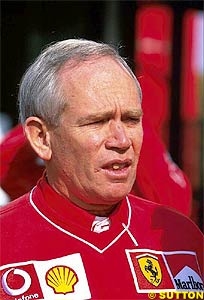 Wracking up more points in a season than any other team ever have, Ferrari's mega-dominant F2002 machine has quite simply exterminated not only the opposition but, quite possibly, even the sport. The dominance has left the sport's leading figures desperate to slow them down - but Byrne is still trying with all his might to make them go even faster.
Wracking up more points in a season than any other team ever have, Ferrari's mega-dominant F2002 machine has quite simply exterminated not only the opposition but, quite possibly, even the sport. The dominance has left the sport's leading figures desperate to slow them down - but Byrne is still trying with all his might to make them go even faster.
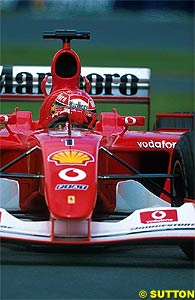 "I think, in ultimate terms, the F2002 is probably the best ever Formula One car," said Byrne. "But cars are improving every year. This is undoubtedly the best car this year, and therefore probably ever, but there is always room for improvement. I don't think there are any areas that I would call 'rubbish' but there are several areas on it that we are improving on for next year, there is no doubt about it."
"I think, in ultimate terms, the F2002 is probably the best ever Formula One car," said Byrne. "But cars are improving every year. This is undoubtedly the best car this year, and therefore probably ever, but there is always room for improvement. I don't think there are any areas that I would call 'rubbish' but there are several areas on it that we are improving on for next year, there is no doubt about it."
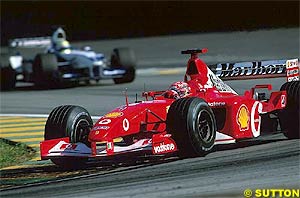 "Last year, relative to Williams, we were generally a bit slower. This year, I would say, we are generally a bit quicker. The two main things that affect straight-line speed are engine power and aerodynamic efficiency and, you know, I think you would be fairly hard pushed to differentiate what was better.
"Last year, relative to Williams, we were generally a bit slower. This year, I would say, we are generally a bit quicker. The two main things that affect straight-line speed are engine power and aerodynamic efficiency and, you know, I think you would be fairly hard pushed to differentiate what was better.
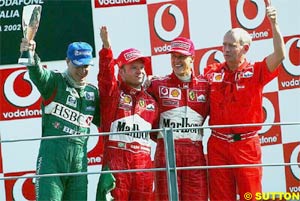 "And really, during that period we had won both the championships, so fundamentally we did very little development on the car after the French Grand Prix. We have done development on the engine and we have done a lot of tyre development that's for sure, so it is not as though overall the package has stood still. It is just really that we have put maximum effort into next year's car from the beginning of July onwards."
"And really, during that period we had won both the championships, so fundamentally we did very little development on the car after the French Grand Prix. We have done development on the engine and we have done a lot of tyre development that's for sure, so it is not as though overall the package has stood still. It is just really that we have put maximum effort into next year's car from the beginning of July onwards."
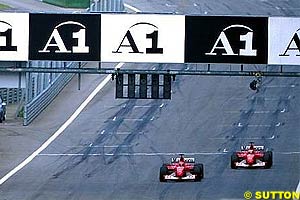 Montoya admitted in Italy that his team had "taken its eye off the ball" and were doing too many things wrong. The example he used was that mid-way through the qualifying session they spotted that the car was bottoming out on the straight and losing speed. They fixed it, he got pole. Simple as that. Well, not quite, but what it does show is that the Williams team are not quite the well-oiled machine of Ferrari.
Montoya admitted in Italy that his team had "taken its eye off the ball" and were doing too many things wrong. The example he used was that mid-way through the qualifying session they spotted that the car was bottoming out on the straight and losing speed. They fixed it, he got pole. Simple as that. Well, not quite, but what it does show is that the Williams team are not quite the well-oiled machine of Ferrari.
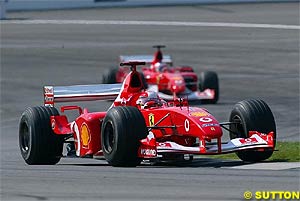 Ferrari have now finished on the podium in 53 consecutive races but it is the fact that Schumacher, due to his astonishing consistency and the team's metronomic perfection, has finished on the podium at every race this year that has highlighted their impressive reliability. Barrichello, meanwhile, had rotten luck with his F2002 in the early part of the year, but Byrne has no explanation for it.
Ferrari have now finished on the podium in 53 consecutive races but it is the fact that Schumacher, due to his astonishing consistency and the team's metronomic perfection, has finished on the podium at every race this year that has highlighted their impressive reliability. Barrichello, meanwhile, had rotten luck with his F2002 in the early part of the year, but Byrne has no explanation for it.
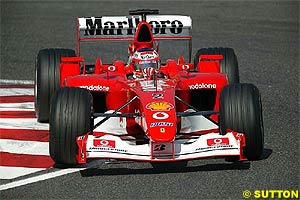 Ferrari, of course, have given Byrne and the rest of us plenty of things to get excited about this year - even if most have been negatively controversial. It is easy to forget, with the end of season cries of 'boring', that Ferrari were beaten fair and square at the second Grand Prix of the year, in Malaysia, and that Schumacher and Montoya fought it out on the track in the early races. But the thing that even split Maranello this year was Austria.
Ferrari, of course, have given Byrne and the rest of us plenty of things to get excited about this year - even if most have been negatively controversial. It is easy to forget, with the end of season cries of 'boring', that Ferrari were beaten fair and square at the second Grand Prix of the year, in Malaysia, and that Schumacher and Montoya fought it out on the track in the early races. But the thing that even split Maranello this year was Austria.
Please Contact Us for permission to republish this or any other material from Atlas F1.
|
Volume 8, Issue 42
Atlas F1 Exclusive
Exclusive Interview with Rory Byrne
Ann Bradshaw: View from the Paddock
Japanese GP Review
2002 Japanese GP Review
Japanese GP Technical Review
Bridgestone: The Shining Quarter
The Human Touch
Stats Center
Qualifying Differentials
SuperStats
Charts Center
Columns
Season Strokes
Elsewhere in Racing
The Grapevine
> Homepage |